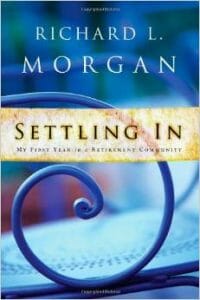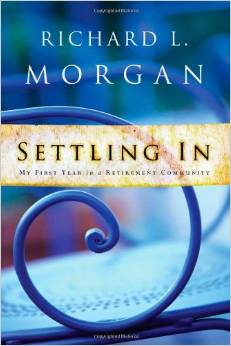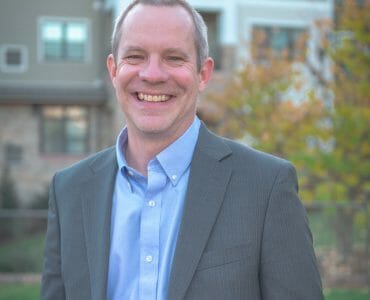“Aging is a time with probable loss; but it is also a time of possible gain.”
– Dr. Henry S. Simmons*
I believe this single quote captures the spirit of the book written by Richard L. Morgan entitled Settling In, My First Year in a Retirement Community. This book was suggested to me by Mona Hershey, who has lived at Messiah Village for over 25 years, and I am very grateful for her recommendation.
Mona shared with me, “I wish I would’ve read this book when I first moved in 25 years ago; it would’ve been very helpful.” But this book is a must-read not only for people like Mona, but even more so for those struggling with the decision to move to a retirement community or are currently struggling with the transition. I would also highly recommend this for those who work in a retirement community or with older adults in some capacity. Personally, though I‘ve worked in long-term care for almost two decades, Morgan refreshed my perspective on the fear, uncertainty, and loss, as well as the joy, sense of belonging, and self-discovery residents experience as they become part of the family at a Continuing Care Retirement Community (CCRC).
Dr. Morgan, a retired Presbyterian minister and author of several other books including Remembering Your Story and At the Edge of Life, chronicles the journey of he and his wife’s move from their home of 50 years in North Carolina to a retirement community in Western Pennsylvania. I was quite moved by this book and was able to connect with his story very easily. For one, I grew up in Western Pennsylvania, spent several summers living in North Carolina, but most importantly have been a part of the culture and family of a CCRC having worked at Messiah Village since 2004.
He preaches proactivity and making responsible decisions, which helps shape his post-retirement path. After five decades of warm weather, deep roots and the only home they’d had known as a couple in North Carolina, he reveals their life-altering journey up north, near his daughter’s home, to Redstone Highlands, a CCRC much like the non-profit Christian-based Messiah Village. He recognized, though relatively young at 74 and in good health, it was time to make this move. His spirit, faith, and mental and physical health are all tested throughout this yearlong reflection. Initially his new life seems exciting and fresh, but amongst the peaks there are many troughs, and the “noonday demon,” referring to depression, especially over the cold harsh winter. He’s very frank about his experience and lamenting, and questions, “why did we move here?”, “was this the right decision?”, “did we move too soon?” He also expresses his feelings about the three types of residents living at Redstone – “loners,” “gamesters,” and “volunteers,” and how each reflect a residents attitude toward their new environment. Month to month he shares his sorrow for the loss and sad truths that often exist in the lives of older adults. His personal journey through the many stages of a move like this is both cautionary and thought provoking. There are bleak realities, yet rays of hope and opportunity.
But the real power of this book is the growth, spirituality, and self-awareness that one can achieve later in life, no matter where you call “home.” He reminds us that life is what you make of it and references Kairos versus Kronos time, the prior essentially making the most of your time and the latter referring to the chronological time that all too many of us watch with worried eyes. His desire to have purpose and feel valued, along with his strong faith in God and years as a pastor, helped him find his niche at Redstone. He gravitated towards volunteering and ministering to other residents, especially those with dementia, adding that they more than anyone deserve extra love and attention. Additionally, he highlights other residents who make their latter stage of life productive, philanthropic, and purposeful. It should motivate readers to find what matters to them at any stage of life, but particularly the third stage.
Settling In challenges mainstream thoughts about getting older, particularly within the confines of a retirement community. Throughout the book I felt like Morgan was talking about Messiah Village or at least imagined he was. To an end, I feel that for many outsiders looking in, a CCRC may “look like a place where a bunch of old people live,” where loss is an everyday occurrence. But if we break down this dissonant thought – there are “people” in CCRCs, they happen to be “older,” but most importantly they are “living.” They live, love, grow, care, volunteer, minister, learn, laugh, swim, dance and so much more.





